Our Top 12 Picks for the Best Ecommerce Platforms in 2025
Thinking about taking your business online? It’s a huge step, and honestly, it can feel a little overwhelming. You’ve probably heard a dozen different names thrown around, seen ads for platforms promising the world, and now your head is spinning. We get it. We’ve been there with so many Okanagan business owners, from wineries in Penticton to boutiques in downtown Kelowna. It often feels like you have to become a tech expert overnight.
The good news? You don’t. You just need a clear, honest guide to what’s out there so you can find a platform that truly fits your business. The right one feels less like a piece of software and more like a reliable business partner. It’s the kind of partner that handles the tricky stuff so you can focus on what you do best… running your amazing business.
So, let's get you sorted. We’re going to walk through the top options, skipping all the confusing jargon. This guide will give you the straight-up details on what works, who it’s for, and what to watch out for with each choice. We’ve included screenshots and direct links to make it even easier. This is all about finding the tool that fits your dream, your budget, and your customers. When you’re ready for a team to help you build and launch it, we're right here to help.
1. Shopify
If you're looking to get an online store up and running quickly, Shopify is often the first stop. It's an all-in-one platform, which means it handles all the technical stuff like hosting, security, and updates for you. This makes it one of the best ecommerce platforms for business owners who want to focus on their products and marketing, not on server maintenance.
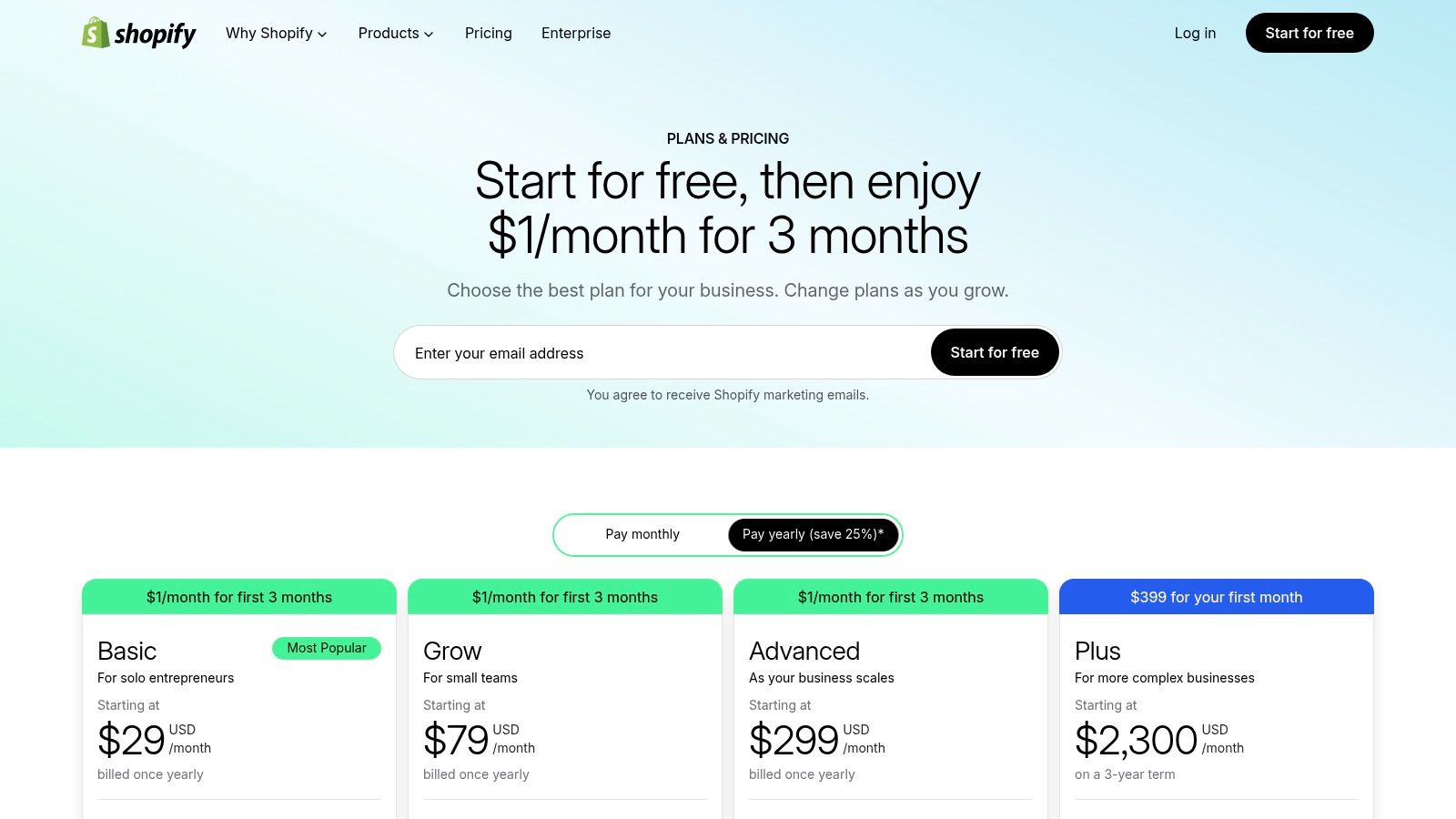
Shopify’s real power is in its simplicity and scalability. You can start with a basic plan and a pre-made theme, and as your business grows, you can add powerful features through its massive App Store. Need advanced loyalty programs, subscription boxes, or custom product personalizers? There’s an app for that. This flexibility is why you’ll see everyone from small Kelowna-based artisans to massive international brands using it. Plus, site performance is a huge focus for them, so you can count on a fast-loading store.
Key Details & Considerations
-
Best For: Businesses of all sizes, from startups to enterprise-level brands, who value ease of use and a fast launch.
-
Pricing: Plans start at around $39 CAD/month for the "Basic" tier, with "Shopify" and "Advanced" tiers offering more features. Shopify Plus is their enterprise-level solution with custom pricing.
-
Pros: It’s incredibly user-friendly, scales beautifully, and offers fantastic 24/7 support. The checkout process is optimized for conversions right out of the box.
-
Cons: Transaction fees apply if you don't use Shopify Payments. Also, the monthly cost of third-party apps can add up as you add more functionality.
For more on getting the most out of the platform, you can learn more about Shopify's site speed tools and how they impact sales.
2. BigCommerce
BigCommerce is a powerhouse for businesses that want more functionality built right into their platform from day one. It's known for having a ton of robust, out-of-the-box features, which often means you'll spend less time and money hunting for third-party apps to get things done. This makes it one of the best ecommerce platforms for established stores or those with complex catalogs, especially in the B2B space.
The platform really shines with its deep native commerce tools. Think advanced SEO controls, unlimited products and bandwidth on every plan, and powerful multi-storefront capabilities for selling internationally or across different brands. It’s built to handle growth without forcing you into expensive upgrades just to access core features. This is a huge plus for businesses in places like Vernon or Penticton looking to expand their reach without constantly reinvesting in new tools. It gives you a solid foundation to build on.
Key Details & Considerations
-
Best For: Growing businesses and established B2B sellers who need powerful built-in features and fewer paid add-ons.
-
Pricing: Plans typically start around $39 USD/month, with Plus and Pro tiers offering more advanced features. There's also an Enterprise solution for large-scale operations.
-
Pros: Incredible amount of built-in functionality, strong SEO capabilities, and it's great for international selling. You also get 24/7 support.
-
Cons: The design interface can feel a bit less intuitive than some competitors. Also, plans have annual revenue thresholds that can trigger a mandatory upgrade.
Getting the platform's powerful features to work perfectly for your brand is key, and you can learn more about professional BigCommerce web design to see how a partner can help.
3. Wix eCommerce
If you're known more for your creative eye than your coding skills, Wix eCommerce might be your perfect match. It started as a drag-and-drop website builder and has evolved into a powerful ecommerce platform that makes getting a beautiful, functional store online incredibly simple. It’s an all-in-one solution, so your hosting, security, and even backups are all managed for you, which is a huge relief.
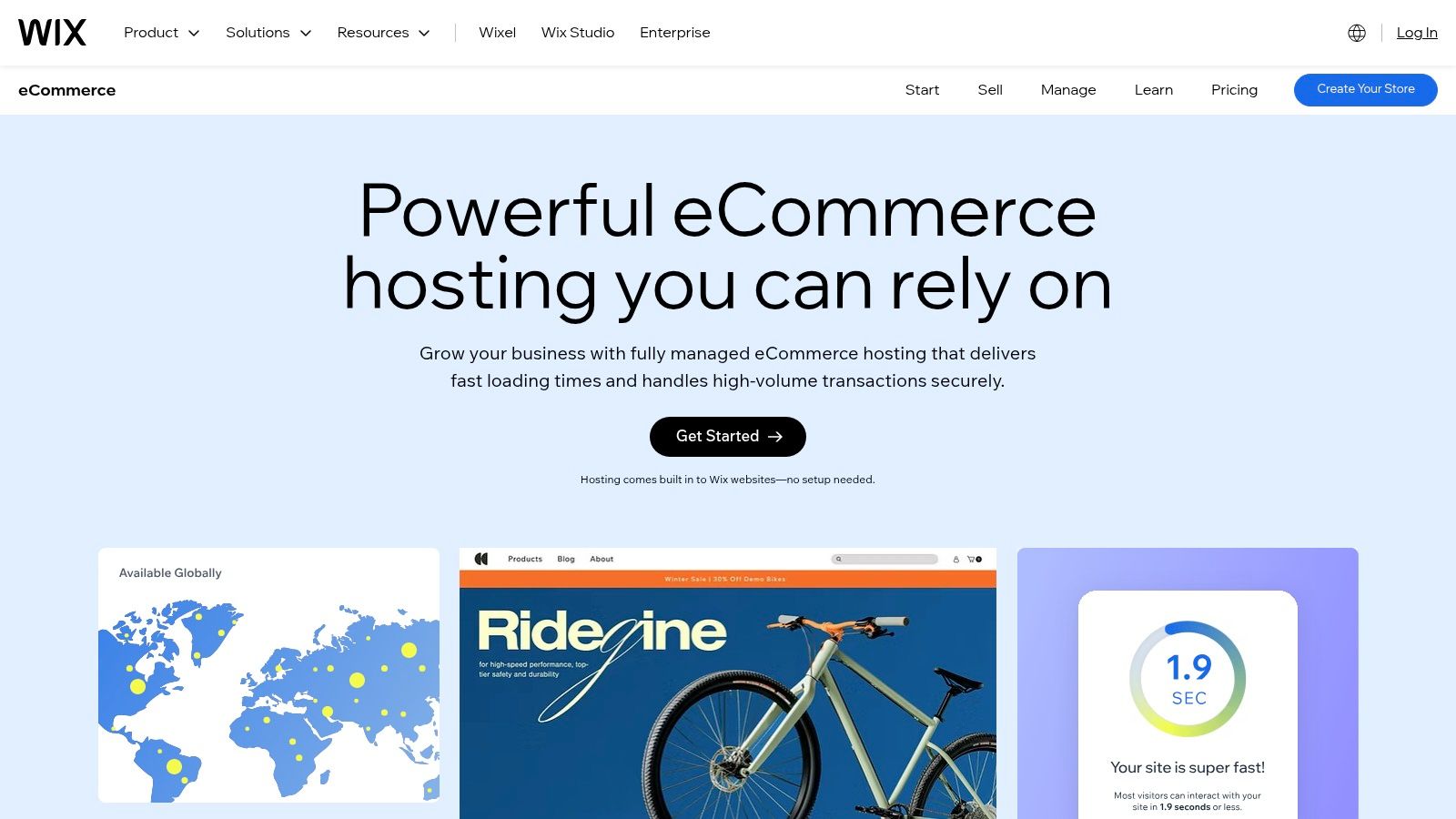
The real draw here is the design freedom. With over 900 templates and an intuitive editor, you can create a truly custom-looking storefront without writing a single line of code. Wix also bundles in a ton of valuable tools right from the get-go, like built-in SEO features, email and SMS marketing, and analytics to track your progress. For a small Okanagan business wanting a professional online presence without a massive technical headache, this platform is one of the best ecommerce platforms to get started with and grow.
Key Details & Considerations
-
Best For: Small to mid-sized businesses, artisans, and entrepreneurs who prioritize beautiful design and an easy-to-use, all-in-one system.
-
Pricing: Business and eCommerce plans like "Core" and "Business Elite" offer tiered features, with more resources at higher levels. It's fully available in Canada with CAD pricing and tax/shipping integrations.
-
Pros: It's exceptionally fast to launch a store with its simple design experience. The all-in-one nature (hosting, SSL included) is a major plus, and it scales well as your business grows.
-
Cons: Adding functionality through the Wix App Market can increase your monthly costs. You may find less granular control over specific commerce features compared to more specialized platforms.
You can start building your store right away at wix.com.
4. Squarespace Commerce
If your brand is built on stunning visuals and compelling content, Squarespace Commerce is where you'll feel right at home. It’s a design-forward platform that seamlessly blends a top-tier website builder with powerful ecommerce tools. This makes it one of the best ecommerce platforms for creators, artists, and brand-led businesses that need their digital storefront to be as beautiful as their products. Think of it as a gallery and a shop all in one.
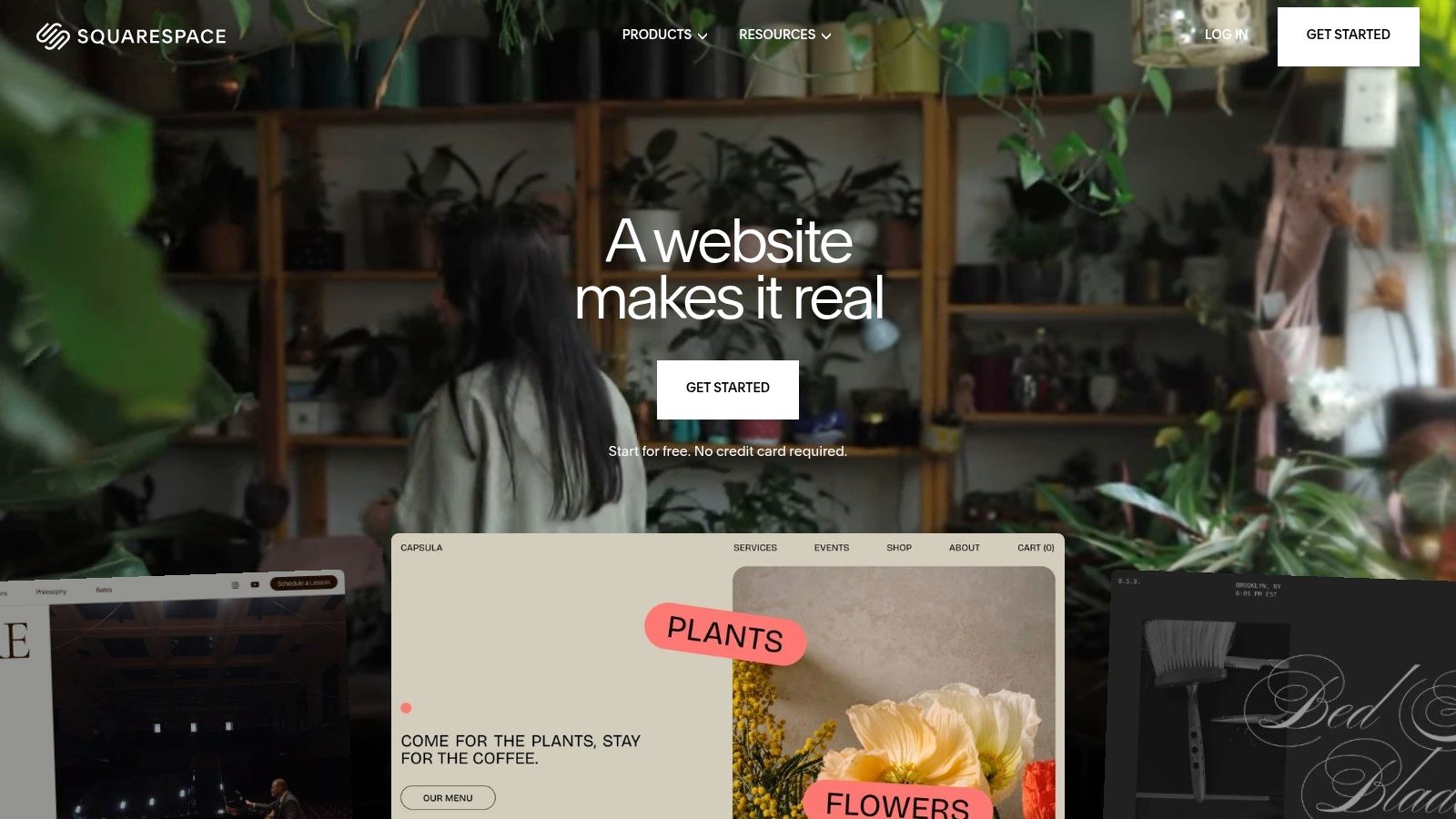
The strength of Squarespace is its all-in-one nature, especially for businesses that value simplicity and aesthetic control. Everything from modern themes and built-in email marketing to analytics is managed from one clean dashboard. It’s perfect for a Penticton-based winery that needs to sell bottles online while also showcasing its story and vineyard through a blog and photo galleries. The managed hosting and 24/7 support mean you can focus on creating, not on technical upkeep. It’s a fantastic choice for merging content with commerce.
Key Details & Considerations
-
Best For: Creators, brand-focused businesses, and stores with smaller catalogs that prioritize design and content.
-
Pricing: Commerce plans typically start with a "Business" plan and scale up to "Commerce Basic" and "Commerce Advanced" tiers, which unlock more features like abandoned cart recovery.
-
Pros: It offers award-winning templates and excellent design capabilities. The end-to-end setup is very straightforward, making it a great fit for brands just starting their ecommerce journey.
-
Cons: It’s less extensible than platforms like Shopify for complex operations or large inventories. Plan features and transaction fee structures can change, so it's wise to check their current pricing.
5. WooCommerce
For business owners who already love their WordPress website and want to add selling capabilities, WooCommerce is the natural choice. It's an open-source plugin, which means it transforms your existing WordPress site into a powerful online store. This gives you ultimate control over your brand, data, and the customer experience, making it one of the best ecommerce platforms for those who value customization.
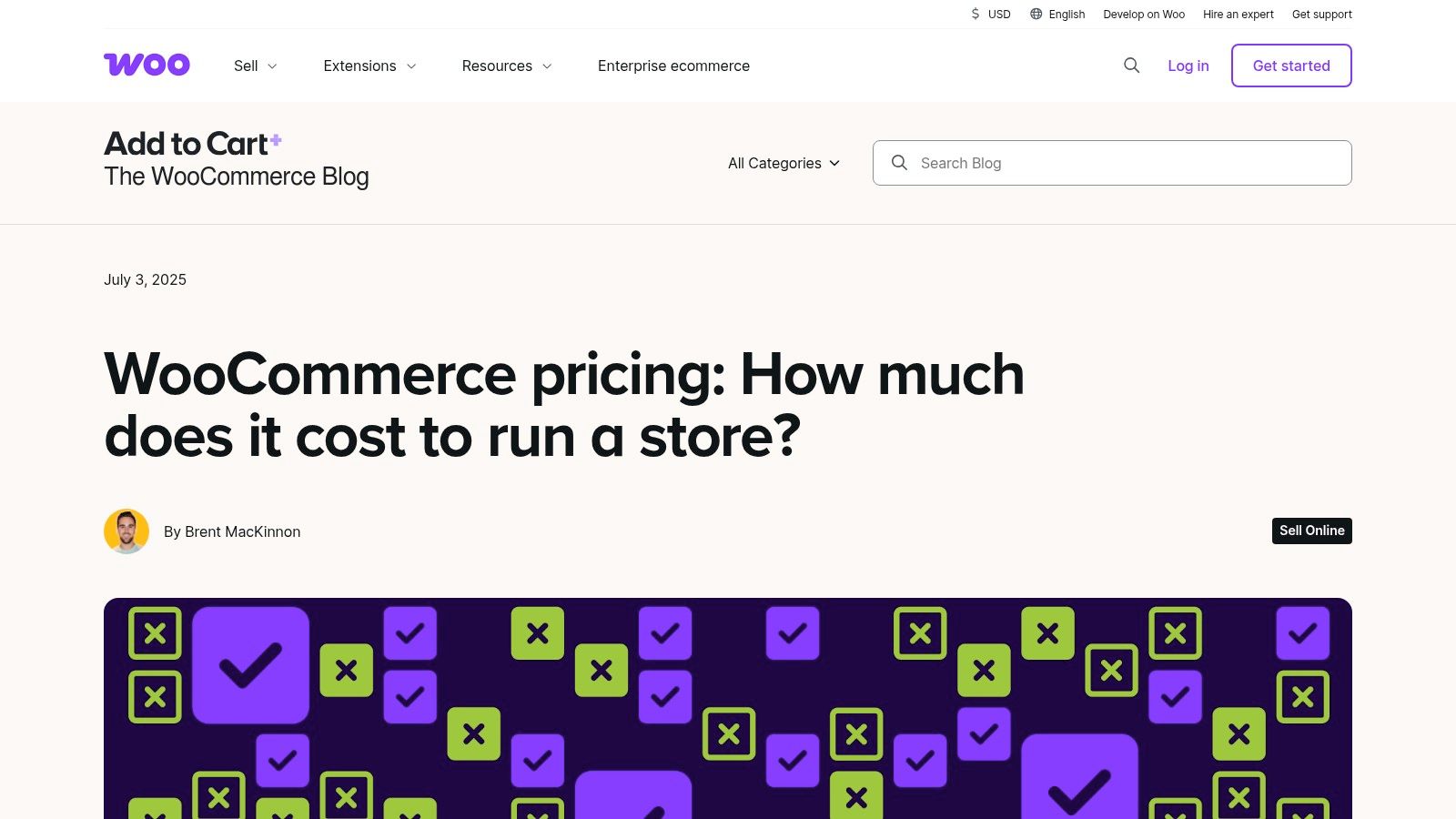
The biggest draw of WooCommerce is its incredible flexibility. Since it's built on WordPress, the customization possibilities are practically endless. Through thousands of themes and extensions, you can build almost any kind of store imaginable, from a simple Okanagan boutique selling local goods to a complex B2B portal with subscription boxes and memberships. You’re in the driver’s seat, managing everything from hosting to security, giving you total ownership. For those wanting a simpler start, the Woo Express bundle offers a hosted solution to get you going faster.
Key Details & Considerations
-
Best For: Businesses with an existing WordPress site or those who want complete control and ownership over their ecommerce stack.
-
Pricing: The plugin itself is free, but costs come from web hosting, themes, and paid extensions. Woo Express offers bundled pricing for a hosted setup.
-
Pros: It offers full control over your store's data and design. The massive ecosystem of developers and extensions means you can build any feature you need. It’s also very cost-effective if you can manage the technical side yourself.
-
Cons: You are responsible for your own hosting, security, and updates, which requires technical knowledge. The costs of premium extensions and custom development can also add up.
To dig deeper into how it stacks up against other platforms, you can explore our comparison of WordPress and Shopify for more insights.
6. Adobe Commerce (Magento)
For large-scale businesses with complex needs, Adobe Commerce (formerly Magento) is a true powerhouse. This isn't a simple plug-and-play solution; it's an enterprise-grade platform designed for deep customization and complex, multi-brand global operations. It offers robust B2C and B2B capabilities right out of the box, from managing multiple international storefronts to handling intricate quoting and company account structures.
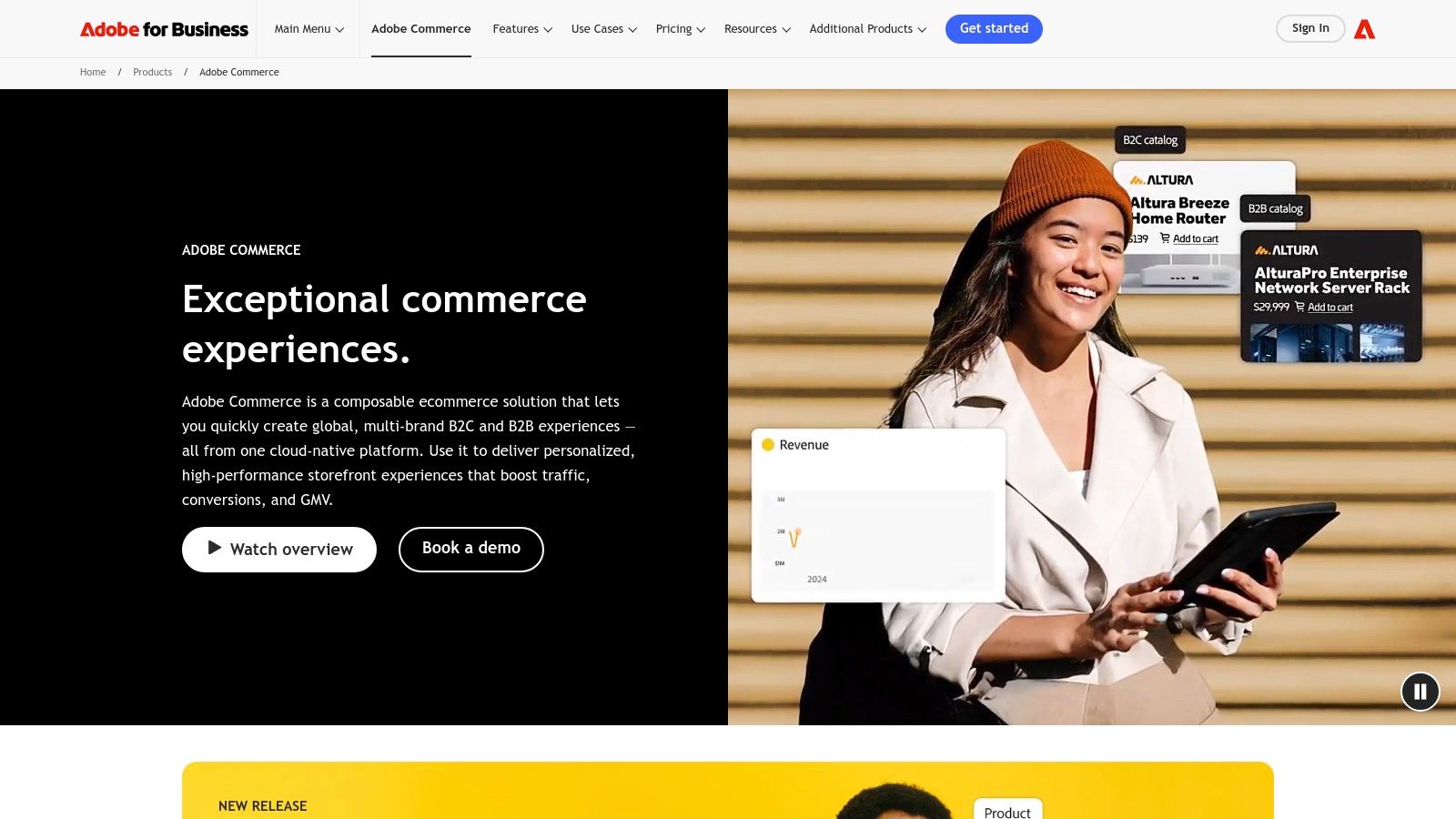
The real strength of Adobe Commerce is its limitless flexibility. Its headless, API-first architecture means you can create truly unique customer experiences and integrate them tightly with other systems, especially the Adobe Experience Cloud. It has a powerful engine for advanced promotions, tiered pricing, and sophisticated product catalogs. This is why it remains one of the best ecommerce platforms for established businesses that require a highly tailored solution and have the development resources to build and maintain it.
Key Details & Considerations
-
Best For: Enterprise-level B2B and B2C businesses with complex product catalogs, global operations, and a need for deep customization.
-
Pricing: Quote-based licensing. The total cost of ownership is significantly higher due to implementation, development, and hosting needs.
-
Pros: It’s extremely powerful and customizable for complex workflows. It offers strong globalization features for multi-site management and has a massive ecosystem of experienced implementation partners and agencies.
-
Cons: It carries a very high total cost of ownership and absolutely requires an experienced development partner for implementation and maintenance. This is not a platform for beginners.
You can explore Adobe Commerce's full capabilities on their official site.
7. Salesforce Commerce Cloud
When your business operates on a massive scale, you need a platform built for that level of complexity. Salesforce Commerce Cloud is an enterprise-grade solution that’s less of a simple store-builder and more of a complete digital commerce engine. It's designed for large-scale operations that need to unify customer experiences across every touchpoint, from marketing and sales to customer service.
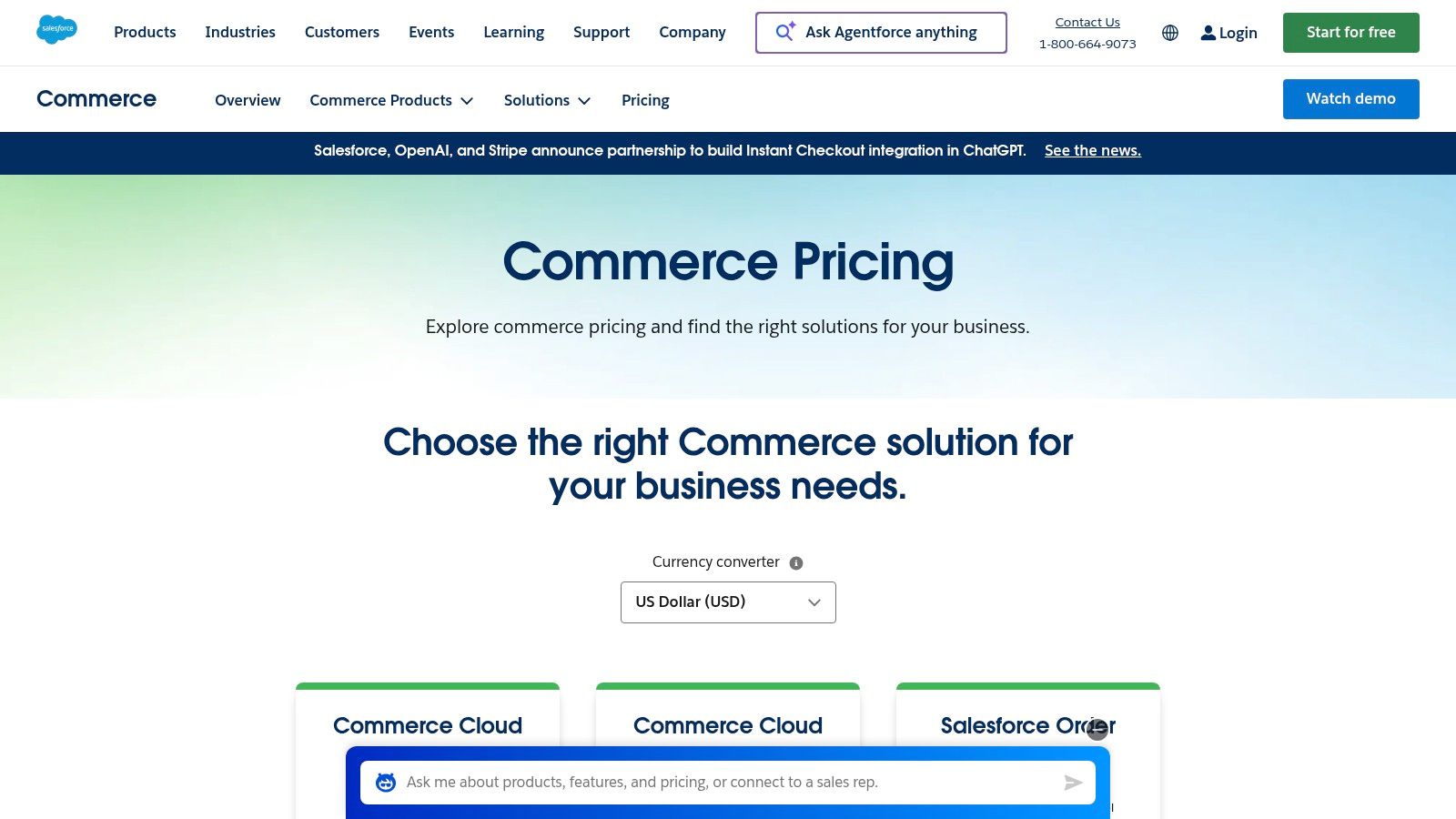
The real strength here is its deep integration with the wider Salesforce ecosystem, including its powerful CRM and AI tools. This allows for incredible personalization and a single view of the customer across all channels. You can manage global orders, payments, and storefronts all from one place, with editions tailored specifically for either B2C or B2B businesses. It's one of the best ecommerce platforms for enterprises needing a robust, data-driven foundation.
Key Details & Considerations
-
Best For: Large, established brands and enterprise-level businesses requiring a deeply integrated, scalable commerce solution with powerful CRM capabilities.
-
Pricing: Pricing is quote-based and tailored to your business needs, often tied to your Gross Merchandise Volume (GMV) or specific user tiers. You can find more on their pricing page.
-
Pros: It provides a unified view of customer data across all business functions. It’s built for global scale and has an extensive partner ecosystem for support. Also, its governance and security features are top-tier.
-
Cons: The platform’s power comes with significant implementation complexity. The cost is substantial and not suited for small or medium-sized businesses.
8. Square Online (by Block)
If you're a local business, cafe, or service provider already using Square's payment hardware, Square Online is a fantastic and logical next step. It's built to turn your in-person business into an omnichannel powerhouse, syncing your inventory, sales, and customer data between your physical location and your online store. This integration is its core strength, making it one of the best ecommerce platforms for businesses that juggle both a storefront and a website.
The platform is designed for speed and simplicity. You can launch a functional, good-looking site in an afternoon, especially if your product catalog is already in your Square POS. It excels at local commerce, with built-in features for curbside pickup, local delivery, and even integrations with on-demand delivery services. This focus on local operations is a huge win for Okanagan restaurants or retailers who need to get online fast without a massive technical headache.
Key Details & Considerations
-
Best For: Retailers, restaurants, and service-based businesses already using or planning to use Square POS for a unified online and in-person experience.
-
Pricing: Starts with a completely free plan (you only pay processing fees). Paid plans like "Plus" and "Premium" unlock more advanced features like custom domains and abandoned cart recovery.
-
Pros: The free plan is very generous and functional. Its seamless integration with Square POS is unmatched, and setup is incredibly quick. Transparent Canadian processing fees are a big plus.
-
Cons: Customization options are more limited compared to other platforms. It may not be the best fit for businesses with complex product catalogs or specific B2B needs.
To see how it works, you can explore Square Online's features and see if its streamlined approach fits your business.
9. Lightspeed eCom
For brick-and-mortar retailers, especially those here in Canada, syncing in-store and online sales can be a real headache. Lightspeed eCom tackles this head-on. It’s a commerce platform built from the ground up to integrate a powerful retail Point-of-Sale (POS) system with a capable online storefront. This means your inventory, sales, and customer data are unified, whether a sale happens at your Kelowna storefront or on your website.
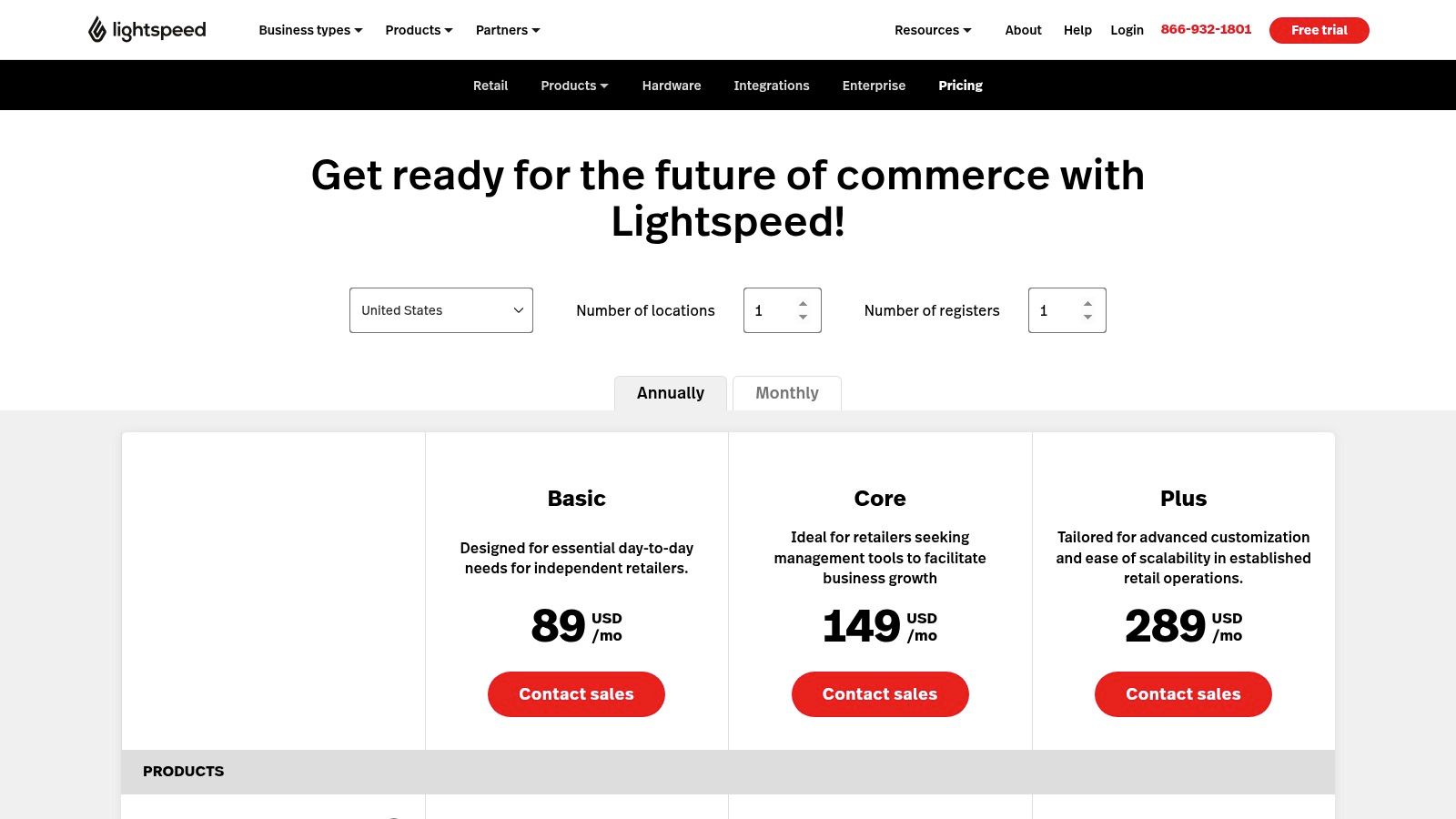
The platform's strength is its deep retail DNA. It handles complex inventory situations, like multi-store stock and detailed price books, with ease. Montreal-based Lightspeed offers dedicated Canadian support and its own payment processing system, Lightspeed Payments, which simplifies things for local businesses. This makes it one of the best ecommerce platforms for established retailers who need their digital operations to perfectly mirror their physical ones, not just act as a separate channel. It’s about creating one seamless business.
Key Details & Considerations
-
Best For: Established retail businesses with one or more physical locations that need a tightly integrated POS and ecommerce system.
-
Pricing: Pricing is often bundled with their POS systems, and you'll likely need to get a combined quote. Online-only plans exist but the platform shines with the POS integration.
-
Pros: Outstanding POS and ecommerce integration for unified operations. Strong Canadian support and payment processing. Advanced inventory management is perfect for multi-location merchants.
-
Cons: The platform's primary focus is on its POS bundles, which can influence pricing. It has less theme and app variety compared to more ecommerce-centric platforms.
For more information, you can explore Lightspeed’s retail pricing options to see how it fits with their POS systems.
10. Ecwid by Lightspeed
What if you already have a website you love, maybe a WordPress blog or a Squarespace portfolio, but just want to add a store to it? That’s exactly where Ecwid by Lightspeed shines. Instead of making you start over, it lets you embed a full-featured online store right onto any existing site. It’s a brilliant way to dip your toes into ecommerce without a complete website overhaul.
The real magic of Ecwid is its flexibility. You can add your store to one site, and then just as easily start selling those same products on Instagram, Facebook, and other marketplaces. It centralizes your inventory so you’re not scrambling to update stock levels everywhere. For a Kelowna-based business looking to expand from a simple blog to a multi-channel sales machine, Ecwid is one of the best ecommerce platforms because it grows with you, simply. It's built to be fast and lightweight, adding powerful selling tools without slowing you down.
Key Details & Considerations
-
Best For: Small businesses and entrepreneurs who want to add ecommerce functionality to an existing website or sell across social media channels without a complete rebuild.
-
Pricing: A free plan is available for up to 5 products. Paid plans like "Venture," "Business," and "Unlimited" start around $24 CAD/month and add more features like abandoned cart recovery and subscriptions.
-
Pros: It’s incredibly fast to set up on any website. The multi-channel selling is seamless, and it offers transparent pricing that’s easy to understand.
-
Cons: The feature set isn't as deep as all-in-one platforms for businesses with highly complex product catalogs. Some key marketing tools are reserved for higher-tier plans.
You can explore Ecwid's pricing and features to see how it could fit into your current website.
11. PrestaShop
If you're a business owner who craves total control and technical flexibility, PrestaShop is a compelling open-source option. Unlike all-in-one platforms, it gives you the freedom to choose your own hosting, which can be a huge advantage for managing costs and performance. It’s particularly popular in Europe and Latin America, offering strong multi-language and multi-currency features right out of the gate.
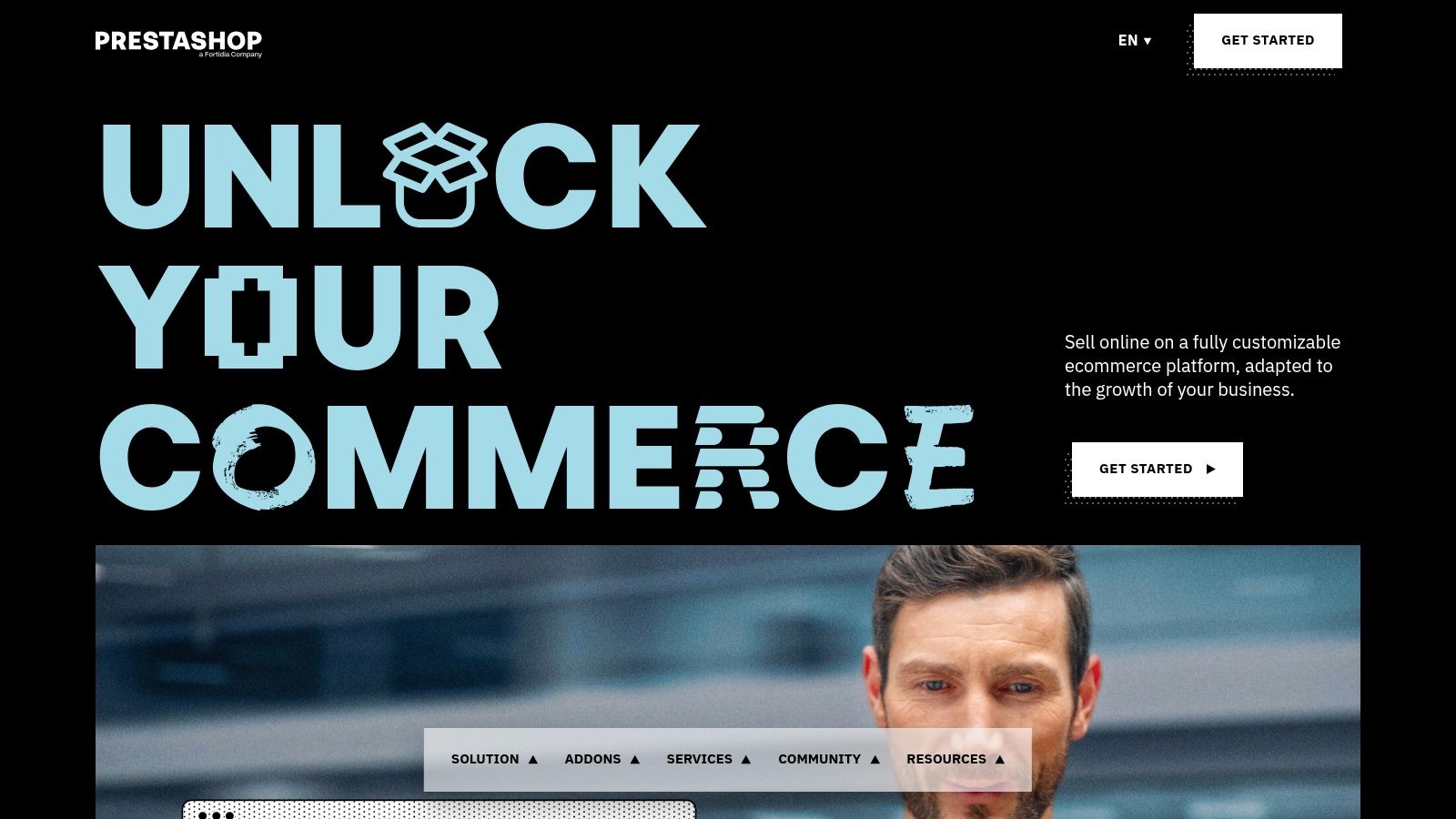
The core strength of PrestaShop is its ownership model. You aren’t renting your store; you own the software. This opens up deep customization possibilities through its extensive marketplace of modules and themes. You can start with the free, self-hosted 'Classic' edition if you've got the technical chops, or opt for their Hosted and Enterprise plans for managed infrastructure and support. For businesses with specific needs that off-the-shelf solutions can't meet, PrestaShop provides a powerful, adaptable foundation, making it one of the best ecommerce platforms for developers and tech-savvy merchants.
Key Details & Considerations
-
Best For: Technically-inclined merchants and businesses wanting full ownership and deep customization without platform revenue sharing.
-
Pricing: The self-hosted software is free. Hosted plans and Enterprise solutions come with monthly fees and are priced based on need.
-
Pros: High degree of flexibility and customization. There are no platform transaction fees, and you have complete control over your data and hosting environment.
-
Cons: The self-hosted version requires significant technical knowledge for setup, security, and maintenance. Managing module compatibility during updates can also be a challenge.
You can learn more by visiting the official PrestaShop website.
12. Shift4Shop (formerly 3dcart)
Shift4Shop, which you might remember as 3dcart, positions itself as a powerhouse of built-in features. It aims to give merchants a robust toolkit right from the start, avoiding the need to immediately hunt for third-party apps for core functionalities like SEO, promotions, and real-time shipping calculations. This makes it one of the best ecommerce platforms for business owners who want a comprehensive solution without a complicated setup.
The platform's main draw is its unique pricing model. For U.S.-based merchants who use the in-house Shift4 payment processing, the entire platform can be completely free. This includes unlimited products, staff accounts, and bandwidth, which is a compelling offer for businesses looking to minimize their monthly overhead. It’s a bold move designed to attract merchants from other platforms by eliminating the recurring software fee, letting them focus their budget on marketing and inventory instead.
Key Details & Considerations
-
Best For: Budget-conscious businesses that need a wide array of features out of the box and are willing to use Shift4's payment processing.
-
Pricing: A free "End-to-End" plan is available if you process over $500 USD/month through Shift4. Other paid plans exist if you prefer to use a different payment gateway. Note that Canadian businesses should verify their eligibility for the free tier.
-
Pros: It’s extremely cost-effective with the free plan. You get a huge number of built-in tools for marketing, SEO, and shipping, plus platform-level fraud protection.
-
Cons: The "free for life" offer is tied to using their payment processor and meeting certain criteria, which won't suit everyone. Its theme and app ecosystem is smaller compared to major players like Shopify.
To see if this cost-saving platform fits your needs, you can explore Shift4Shop's features here.
Top 12 Ecommerce Platforms — Core Features Comparison
| Platform | Target audience | Key features | Unique selling points | Pricing & scale |
|---|---|---|---|---|
| Shopify | SMB → Enterprise merchants, omnichannel retailers | Hosted storefront + POS, apps, omnichannel sales, high‑converting checkout | Very fast launch, extensive app ecosystem, Shopify Plus for enterprise | Tiered plans (starter → Plus); transaction fees with third‑party gateways, app costs |
| BigCommerce | Growing merchants, B2B and international sellers | Native B2B, headless APIs, unlimited products, advanced SEO | Deep out‑of‑box commerce features, fewer apps needed, strong multi‑currency | SaaS tiers, revenue thresholds may require upgrades |
| Wix eCommerce | Small → mid‑size shops, creators wanting ease | Drag‑and‑drop builder, 900+ templates, built‑in marketing, managed hosting | All‑in‑one simplicity, AI tools, very fast setup | Business/Core/Elite plans, affordable tiers; less granular commerce control |
| Squarespace Commerce | Creators, brand‑led stores, small catalogs | Design‑forward templates, email marketing, subscriptions, analytics | Best‑in‑class templates and merchandising, simple end‑to‑end setup | Commerce plans for small catalogs; less extensible than enterprise platforms |
| WooCommerce | WordPress sites, developers, merchants wanting ownership | WP plugin, unlimited customization, thousands of extensions, host choice | Full control of data/stack, large developer ecosystem | Variable costs (hosting, extensions) or Woo Express hosted bundle |
| Adobe Commerce (Magento) | Large enterprises, complex multi‑brand B2B/B2C | Advanced catalog, pricing & promotions, B2B tools, headless APIs | Extremely customizable, global/multi‑site capabilities, Adobe integration | Quote‑based licensing, higher total cost of ownership |
| Salesforce Commerce Cloud | Enterprise retailers needing unified CX | Composable storefronts, Data Cloud personalization, order mgmt, CRM ties | Unified customer data across Salesforce, strong partner ecosystem | Quote‑based pricing often tied to GMV or user tiers |
| Square Online (Block) | Small Canadian businesses, restaurants, service merchants | Free plan, Square payments, pickup/delivery, POS sync, loyalty | Very fast low‑friction setup, transparent Canadian rates, tight POS integration | Free to start; Plus/Premium tiers for advanced features |
| Lightspeed eCom | Brick‑and‑mortar retailers, multi‑location stores | Retail POS + ecommerce, inventory & price books, multi‑store pricing | Strong POS–ecommerce integration, Canadian support, advanced inventory rules | POS + eCom bundles; pricing often quoted for combined solutions |
| Ecwid by Lightspeed | Sites needing embeddable store, quick channel expansion | Embeddable storefront, social/marketplace selling, mobile app | Fastest way to add ecommerce to existing site, flexible channel reach | Clear plan ladder (Starter → Unlimited), transparent pricing |
| PrestaShop | Merchants wanting ownership, multi‑language markets | Self‑hosted free Classic, hosted/enterprise options, module marketplace | No platform revenue share, flexible hosting, vibrant community | Self‑hosted (variable costs) or hosted/enterprise plans with SLAs |
| Shift4Shop (3dcart) | Cost‑sensitive merchants, Shopify migrants | Unlimited products/users, built‑in SEO/marketing, 1‑page checkout, shipping | Very cost‑effective if using Shift4 processing, many built‑in tools | Free if eligible with Shift4 processing; otherwise paid plans, verify Canada eligibility |
So, What's the Next Step?
Okay, let's take a breath. We’ve just explored a dozen of the best ecommerce platforms available, from the straightforward simplicity of Shopify and Wix to the powerhouse capabilities of Adobe Commerce. That’s a lot to process, and it’s completely normal if your head is spinning just a little.
The key thing to remember is that there isn't one single "best" platform for everyone. The right choice is deeply personal. It’s tied to your business goals, your budget, your technical comfort level, and the unique experience you want to create for your customers. It's about finding the digital home that feels right for your brand.
Making Your Final Decision: A Quick Checklist
Before you make that final call, let's boil it all down. Think of this as your final gut-check to make sure you're on the right path. Grab a coffee, sit down, and honestly answer these questions:
-
What's my real budget? Be honest about both the monthly subscription fees and the potential costs for themes, apps, payment processing, and even developer help down the line. A "cheaper" platform can quickly become expensive if you have to buy a dozen apps to get the functionality you need.
-
How much time can I realistically commit? Do you have the hours to dedicate to learning a complex system like WooCommerce, or do you need something like Shopify or Squarespace that lets you get up and running over a weekend? Your time is valuable, so factor it into the equation.
-
Where do I see my business in five years? This is a big one. Are you planning to expand into international markets? Will you need advanced features like wholesale portals or sophisticated inventory management across multiple locations, maybe even here in the Okanagan? Choose a platform that can grow with your ambition.
-
What does my customer really need? Think about their journey. Do they need flexible payment options like Afterpay? Is a seamless mobile experience the top priority? Focusing on their needs will help you prioritize the features that truly matter for creating a smooth, enjoyable shopping experience.
From Choice to Action
Once you've narrowed it down, the real work begins. Implementation is where your vision comes to life. This is the stage where you’ll be choosing a theme that reflects your brand’s personality, setting up your product catalogs, and configuring your payment and shipping options.
Don't be afraid to use the free trials! This is your chance to get a real feel for the platform's dashboard and workflow. Can you easily add a new product? Is the interface intuitive to you? Spending a few days test-driving your top two or three choices can save you a world of frustration later.
Remember, choosing from the best ecommerce platforms is a strategic decision. It's about laying a strong foundation that will support your business for years to come. It’s about building an online experience that feels as welcoming and authentic as walking into a local shop in downtown Kelowna. It’s about creating a space where your customers feel valued and your business can thrive.
You've got this. The perfect platform is out there, waiting to become the engine for your online success.
Feeling a bit overwhelmed by the options? That's what we're here for. For over 30 years, Navigator Multimedia has helped businesses right here in the Okanagan choose and build the perfect ecommerce solution. Let's chat about turning your website into your hardest-working employee. If you’re not sure what the next step is, let’s figure it out together.



